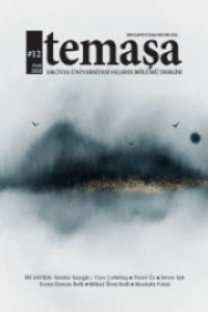Parmenides’in Milet Doğa Felsefesini Reddedişi: Bir Sözde-Problem Eleştirisi
Bu makale, Parmenides’in Miletli filozoflara yönelttiği eleştirinin, onların çözmeye çalıştıkları özdeşlik-değişim probleminin aslında bir sözde-problem (pseudoproblem) olduğunun gösterilmesi olarak yorumlanabileceğini öne sürmektedir. Miletli filozoflarınbirbirlerini sert biçimde eleştirmelerine rağmen geliştirdikleri farklı doğa anlayışları, özdeşlik-değişim geriliminden kaynaklananontolojik problemin meşruiyetini kabul eden ve aynı paradigmanın içinden konuşan ortak bir dil oluşturur. Onlar aynı soruyufarklı arkhe öğretileriyle yanıtlamaya girişirken, Parmenides özdeşlik-değişim gerilimini çözme1yi bu gerilimin iki kutbundanbirisi olan değişimin varlığını kategorik olarak değilleme yoluyla reddeder. Parmenides, Miletli filozofların doğa üzerine geliştirdikleri öğretilerin içeriğine girmeden onları ‘varlık’ yüklemini yanlış kullanmakla eleştirir ve bu yanlış dil kullanımının yol açtığımantıksal çelişkileri ortaya koyar. Sonuç olarak, bu dil kullanımından ortaya çıktığını saptadığı özdeşlik-değişim probleminiiçeriği açısından değil, biçimsel olarak yadsımış olur. Bu bağlamda, makale, “sözde-problem” terimini “dilin yanlış kullanımındankaynaklanan problem” olarak tanımlayarak bu terime modern felsefede popülerlik kazandırmış olan Carnap ile terimin tanımıkonusunda uzlaşmakla birlikte, onun yaptığı gibi bu tanımı pozitivist bir epistemolojiyle temellendirmeyerek ondan ayrılmaktave böylece sözde-problem kavramını normatif değil, betimsel bir kavram olarak kullanmaktadır. Makale, bu betimsel kavramışığında Parmenides’in özdeşlik-değişim problemini nasıl reddettiğini ve bu reddin onun köktenci mantıksal özdeşlik anlayışınıntutarlı ve zorunlu bir sonucu olduğunu göstermeyi amaçlamaktadır.
Parmenides’ Rejection of the Millesian Natural Philosophy: A Pseudoproblem Critique
This paper argues that Parmenides’ critique of Millesian philosophers can be interpreted as a demonstration of the view that the identity-change problem they try to solve is actually a pseudoproblem. Although the Millesians criticize each other amply, their different conceptions of nature acknowledge the legitimacy of the problem arising from the identity-change tension, and they use a common language within the same paradigm. While they try to answer one and the same question based on this tension via different conceptions of arche, Parmenides rejects to resolve this tension by denying categorically the existence of one of its two poles, i.e. change. He criticizes the Millesians’ misuse of the ‘predicate of being’ in their doctrines and presents the logical contradictions resulting from this misuse. Consequently, Parmenides ends up rejecting the identity-change problem in terms of the linguistic form of the Milessian philosophy of nature without discussing the content of it. In this context, although this paper is in agreement on the definition of the term ‘pseudoproblem’ with Carnap, who popularized this term in modern philosophy, unlike him, it does not base this definition on a positivist epistemology, and in this way, it employs the concept of pseudoproblem as descriptive rather than a normative one. In the light of this descriptive conception, the paper aims to show how Parmenides rejects the identity-change problem and how this rejection is a consistent and necessary consequence of his radically logical conception of identity.
___
Aktok, Özgür. “İlkçağ Doğa Felsefesinde Özdeşlik ve Değişim Problemi: Thales, Anaximandros, Anaximenes ve Herakleitos”. Kaygı 20, 1 (2021): 368-383.Aristotle. Metaphysics, ed. W. D. Ross. 2 cilt. Oxford: Clarendon Press, 1924.
Baydur, Suat. Antik Felsefe. 2. Basım. İstanbul: Sosyal Yayınlar, 1994.
Burnet, John. Erken Yunan Felsefesi, çev. Aziz Yardımlı. İstanbul: İdea Yayınevi, 2013.
Carnap, Rudolf. Der Logische Aufbau der Welt. Leipzig: Felix Meiner Verlag, 1928.
Carnap, Rudolf. The Logical Structure of the World. Pseudoproblems in Philosophy, tr. Rudolf A. George. California: University of California Press, 1967.
Curd, Patricia. A Presocratics Reader: Selected Fragments and Testimonia, ed. Patricia Curd. Indiana: Hackett Publishing, 2011.
Denkel, Arda. İlkçağ’da Doğa Felsefeleri. İstanbul: Özne Yayınları, 1998.
Diels, Herrmann. Die Fragmente der Vorsokratiker, ed. Walther Kranz. Berlin: Weidmann, 1952.
Freeman, Kathleen. Ancilla to the Presocratic Philosophers. Oxford: Blackwell, 1948.
Graham, D. W. The Texts of Early Greek Philosophy: The Complete Fragments and Selected Testimonies of the Major Presocratics. 1st Ed. Cambridge: Cambridge University Press, 2010.
Guthrie, W. K. C. A History Of Greek Philosophy: Volume II. Cambridge: Cambridge University Press, 1969.
Heidegger, Martin. Sein und Zeit. 10. Basım. Tübingen: Max Niemeyer Verlag, 1963.
Kirk, G. S., J.E. Raven and M. Schofield. The Presocratic Philosophers: A Critical History with a Selection of Texts. Cambridge: Cambridge University Press, 2013.
Kutschera, Franz von. Platons “Parmenides”. New York: Walter De Gruyter, 1995.
Önder, Derya. “Parmenides’te Varlık ve Düşünme Bağlamında “Var Olan” (On Ti), “Var-Olan (To On/To Eon) ve Varolma (Einai)”. Felsefe Arkivi 47, (II) 2017: 25-41.
Peters, Francis E. Antik Yunan Felsefesi Terimleri Sözlüğü, çev. Hakkı Hünler. İstanbul: Paradigma Yayıncılık, 2004.
Plato. The Republic, çev. Allan Bloom. New York: Basic Books, (1968) 1991.
Sev, Y. Gurur. Fragmanlar-Parmenides. İstanbul: Pinhan Yayıncılık, 2019.
Weier, Winfried. Sinn und Teilhabe. Salzburg, München, 1970.
- ISSN: 2148-371X
- Yayın Aralığı: Yılda 2 Sayı
- Başlangıç: 2014
- Yayıncı: Prof. Dr. Arslan Topakkaya / Erciyes Üniversitesi Felsefe Bölümü
Sayıdaki Diğer Makaleler
Felsefenin Akademideki Yeri Üzerine
Parmenides'in Milet Doğa Felsefesini Reddedişi: Bir Sözde-problem Eleştirisi
Yaşamdan Düşünceye, Düşünceden İdeale Bir Arayış: Ortega y Gasset
Modernizmden Postmodernizme Değişen Özne Anlayışının Sanata Etkileri
Tanım Teorisinin Mantık Disipliniyle Olan İlişkisi: Aristoteles, Farabi ve Port-Royal Düşüncesi
Modern Yurttaşlığın Sinir Uçlarına Dokunmak: Enformel Yurttaşlık
İsmet Özel’in Jazz Şiirinde Kötülük Problemi
